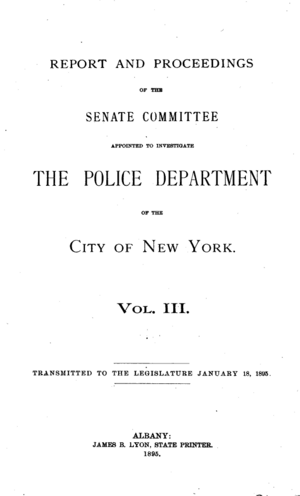Lexow Committee facts for kids
The Lexow Committee was a special investigation held in New York City from 1894 to 1895. It was set up by the New York State Senate to look into serious problems within the New York City Police Department. This investigation was named after its chairman, State Senator Clarence Lexow. It was one of the biggest investigations of its kind in the 1800s.
The committee gathered over 10,000 pages of information during its public hearings. The shocking discoveries from this investigation led to big changes in New York City politics. It helped defeat a powerful political group called Tammany Hall in the 1894 elections. It also led to the election of a new mayor, William L. Strong, who promised to make things better. A social reformer named Charles Henry Parkhurst pushed for these investigations to happen.
Contents
Investigating the Police Department
The Lexow Committee set up its headquarters in the Tweed Courthouse. They looked at information gathered by Charles Parkhurst's City Vigilance League. The committee also did its own investigations.
They found out that some police officers were involved in many unfair and illegal activities. This included asking for money unfairly, taking bribes, and cheating during elections. They also found cases of police using too much force.
One police captain, William Devery, was a key focus. He was questioned by the committee but often gave unclear answers. He would say things like, "touchin' on and appertainin' to that matter, I disremember," meaning he couldn't recall. His vague answers and the committee's findings pushed police leaders to make changes. Devery was accused of taking bribes and was temporarily moved to a lower rank.
One newspaper called the committee's findings "the most detailed accounting of municipal malfeasance in history." This means it was the most complete record of bad behavior by city officials ever found.
The investigation also showed that police officers often had to pay money to get promoted to higher ranks. They would then get this money back by protecting illegal businesses. For example, Captain Timothy J. Creedon said he paid $15,000 to become a captain. Even though he scored very high on his promotion test, he didn't get the rank until he paid. He even said that local businesses helped him pay some of this money.
How the Investigation Changed Things
The leader of Tammany Hall, Richard Croker, left the country for three years when the committee started its work. A new group called the Committee of Seventy was formed. This group was mostly made up of wealthy people who wanted to improve the city. In the 1894 mayoral election, the Republican candidate, William L. Strong, won. This showed that people wanted change.
Key People in the Investigation
Committee Members
- Clarence Lexow – The chairman of the committee.
- Daniel Bradley – A member of the committee.
- Jacob A. Cantor – A member of the committee.
- Edmund O'Connor – A member of the committee.
- George W. Robertson – A member of the committee.
- John W. Goff – The main lawyer for the committee.
- William Travers Jerome – An associate lawyer for the committee.
- Frank Moss (lawyer) – An associate lawyer for the committee.
- William A. Sutherland – An associate lawyer for the committee.
Police Officials
- William "Big Bill" Devery – He was the last superintendent of the New York City Police Department police commission and later the first police chief in 1898.
- Alexander S. "Clubber" Williams – A New York City Police Department Inspector, known as the "Czar of the Tenderloin."
- Thomas F. Byrnes – He led the New York City Police Department detective department from 1880 to 1895.
- Max F. Schmittberger – A New York City Police Department precinct captain in the Tenderloin district and a key witness.
Social Reformer
- Charles Henry Parkhurst – A person who worked to improve society and pushed for the investigation.
 | Dorothy Vaughan |
 | Charles Henry Turner |
 | Hildrus Poindexter |
 | Henry Cecil McBay |


